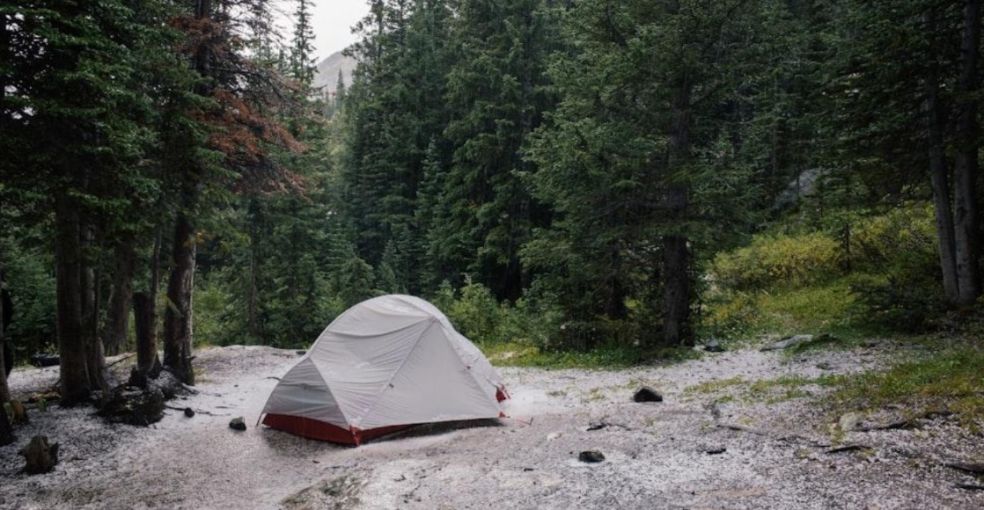
Camping safety tips for UK’s rainiest seasons
Camping is one of the best activities for the body and the mind, as the physical effort combined with mental clarity will help you release all the stress accumulated from your usual lifestyle. At the same time, camping means overcoming the challenges of being uncomfortable in a setting with no internet connection. However, camping during stormy weather will surely make you regret this decision.
In the UK, the best time for camping is between June and July, when the weather is warmer and the days are longer. Still, the camping season starts in April and lasts until October for most people. While the weather is pleasant most of the time, the possibility of heavy rainfall is high, especially since the past year’s climate change affected the regular climate. Experts recorded considerable rainfall even during July in 2023.
Therefore, the weather can be unexpected. If you find yourself exposed to dangerous rainfall during your camping holiday, here’s what to do and how to prepare.
Always pack appropriate gear
Before planning your trip, it’s best to have a list of all the necessary gear to keep you safe and prepared for any inconvenience. You could categorise the items as follows:
- Campsite: tent, sleeping bag, headlamp, lantern;
- Tools: extra cord, mattress repair kit, hammer, saw, dustpan;
- Kitchen: stove, matches, cook pot, utensils, cooler, mug;
- Clothing: moisture-wicking/warm insulated garments, lightweight fleece, boots, sleepwear;
- Hygiene: toilet paper, hand sanitiser, toiletries, quick-dry towel, first-aid kit;
Of course, depending on where you’re camping, some of these items are provided by the campsite owner, but you must check beforehand. Regardless, the campground should be safe and well-maintained so you can truly enjoy it. If there are no signs around, the electrical hook-ups look weird, or the trails are in dangerous condition, you could get injured during rainfall or a windy day. In these cases, you should provide evidence of suffering an accident due to these causes and make a personal injury claim on https://www.personalinjuryclaimsuk.org.uk/ to get the compensation you deserve.
Know how to act during a rainfall
It’s easy to panic during heavy rainfall or even get annoyed at the water that gets inside the tent, but it’s best to stay calm and remember the best practices for protecting yourself. For example, make sure the tent or camping unit door faces the opposite direction of the wind to minimise the amount of water getting in. Of course, you should previously check the tent’s tension and ensure it’s not too loose, so it doesn’t put a lot of stress on the zippers, but not too tense either.
You could also place a tarp above the tent as soon as you put it in place because if the rain starts pouring really intensely, you won’t be able to equip it properly. A spare tarp offers wonderful weather protection. Still, experts advise maintaining a certain amount of ventilation inside during rain, as it can prevent condensation. Keep all windows and vents closed during the rain, but open them immediately as it stops.
Keep yourself warm as much as possible
Unfortunately, besides the uncomfortable wetness and uncertainty of what’s outside the tent, you could also freeze if you’re not warming yourself when it rains. Ideally, you’d bring more layers or wear them directly so that the cold weather will never take you by surprise. A waterproof jacket over a polyester shirt will help you stay warm, but avoid cotton clothes as they’ll remain wet for a long time. Always have an extra bag of clothes in case of a dramatic rainfall.
When sleeping or sitting in the tent, you could bring a bivy bag as an extra layer of insulation that will also protect the sleeping bag from moisture. Of course, an additional sleeping bag will benefit you greatly, especially if it insulates even when wet.
Moreover, having hard warmers will come in handy when you’ve got poor circulation after sitting in the tend for so long or sleeping in a bag, where you cannot move that much.
Know what to expect from others
The best way to prepare for camping and understand all the possible events that could happen is to watch a lot of camping-related content and seek pages and people with a lot of experience in this activity. Camping YouTube channels are plenty, as many influencers share their best tips on making the most out of the trip.
For example, the Survival Lily channel will teach you many survival skills, show you what it’s like to be in a rainstorm overnight and show you the items you need to bring if you camp alone. Another great example is Joe Robinet, who will tell you how he learned critical bushcraft skills and how you can also pick them up.
This step is highly recommended, especially if you’re a beginner and envision a dreamy camping holiday. While you may see people romanticising camping on the internet, the truth is that this activity can sometimes be pretty challenging due to changing factors like the weather, wildlife, and your ability to withstand issues.
The dangers of camping
As mentioned before, camping can get dangerous if you’re not aware of the potential hazards. Not starting the fire correctly can lead to a spark and a fire danger, while animals and insects, such as snakes and hornets, can be pretty scary and even carry illnesses.
If you’re tempted to eat plants and berries in the woods or remote areas, it’s best not to because they can cause poisoning, but you will also feel sick at high altitudes. Finally, the possibility of falling or getting injured is considerable.
Are you prepared for camping in the rain?
While the weather in the UK is almost constantly rainy, sometimes the rainfall can become quite aggressive and get into your tent and wet your clothes. Therefore, you should prepare waterproof clothes and proper gear to avoid getting sick from being cold, but it’s also best to check in with YouTubers and camping influencers so as not to have your hopes high up.
















